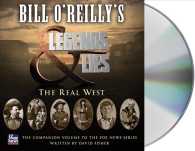- ホーム
- > 洋書
- > 英文書
- > Business / Economics
Full Description
This innovative Handbook demonstrates that there is no single best approach to conducting longitudinal studies. At their best, longitudinal research designs yield rich, contextualized, multilevel and deep understanding of the studied phenomenon. The lack of resources in terms of time, funding and people can pose a serious challenge to conducting longitudinal research. This book tackles many of these challenges and discusses the role of longitudinal research programmes in overcoming such obstacles.This book shows how longitudinal research methods enable the understanding of dynamics, mechanisms, causalities and interrelationships of organizational and business concepts in context and in relation to time. It discusses the richness and versatility of longitudinal research and offers, to students and experienced scholars alike, numerous viewpoints, reflections and personal accounts about conducting longitudinal research, from planning and fieldwork to reporting and managing of research projects.
Contributors: L. Aarikka-Stenroos, E.A. Alfoldi, P. Dawson, P. Eriksson, A. Halinen, M.E. Hassett, R. Hoy, T.D. Little, T. Mainela, C. Mari, O. Meglio, M.-J. Oesterle, E. Paavilainen-Mäntymäki, Y. Ploudre, M. Rhemtulla, H.N. Richta, M.A. Sartor, J.P. Selig, T.W. Taris, Z. Vincze, C. Welch
Contents
Contents:
1. Longitudinal Research in Organizations: An Introduction
Melanie E. Hassett and Eriikka Paavilainen-Mäntymäki
Vignette: Nonresponse in Longitudinal Research: Charting the Terrain
Toon W. Taris
PART I: LONGITUDITNAL RESEARCH AS QUANTITATIVE RESEARCH
2. Using Quantitative Longitudinal Data to Analyse the Relationship between Firm's Internationalization and Performance
Michael-Jörg Oesterle and Hannah N. Richta
3. Planned Missing Data Designs for Longitudinal Organizational Research
Mijke Rhemtulla and Todd D. Little
4. Temporal Design in Organizational Research
James P. Selig, Robert Hoy and Todd D. Little
PART II: LONGITUDINAL RESEARCH AS QUALITATIVE RESEARCH
5. Studying Strategy Over Time through the Identification of Patterns of Actions: An Illustrative Case Study of the Strategies of Alcan and Alcoa from 1928 to 2007
Yves Ploudre
6. Longitudinal Autoethnography
Päivi Eriksson
7. Narratives as Longitudinal and Process Data
Eriikka Paavilainen-Mäntymäki and Leena Aarikka-Stenroos
PART III: LONGITUDINAL RESEARCH AS PROCESS RESEARCH
8. In Search of Generative Mechanism: The Grounded Theory Approach to Process Theory Building
Zsuzsanna Vincze
9. Challenges of Longitudinal Field Research in Process Studies on Business Networks
Aino Halinen and Tuija Mainela
10. Temporal Issues in Process Research
Carlo Mari and Olimpia Meglio
11. How to Escape an Unprocessual Legacy? A Viewpoint from International Business Research
Eriikka Paavilainen-Mäntymäki and Catherine Welch
12. The Use of Time in the Design, Conduct and Write-up of Longitudinal Processual Case Study Research
Patrick Dawson
PART IV: CONDUCTING LONGITUDINAL RESEARCH
13. Dealing with Unpredictability and Change in Longitudinal Studies of Organizations: A Priori versus Progressive Focusing Approach
Eva A. Alfoldi and Melanie E. Hassett
14. Planning Data Collection in Longitudinal Field Research: Small and not so Small Practical Issues
Carlo Mari and Olimpia Meglio
15. Organizing and Executing a Longitudinally Based Research Program
Michael A. Sartor
Index








